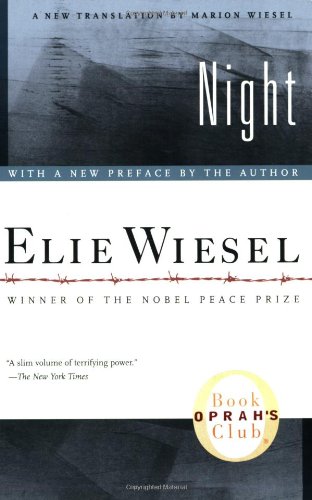All Nonfiction
- Bullying
- Books
- Academic
- Author Interviews
- Celebrity interviews
- College Articles
- College Essays
- Educator of the Year
- Heroes
- Interviews
- Memoir
- Personal Experience
- Sports
- Travel & Culture
All Opinions
- Bullying
- Current Events / Politics
- Discrimination
- Drugs / Alcohol / Smoking
- Entertainment / Celebrities
- Environment
- Love / Relationships
- Movies / Music / TV
- Pop Culture / Trends
- School / College
- Social Issues / Civics
- Spirituality / Religion
- Sports / Hobbies
All Hot Topics
- Bullying
- Community Service
- Environment
- Health
- Letters to the Editor
- Pride & Prejudice
- What Matters
- Back
Summer Guide
- Program Links
- Program Reviews
- Back
College Guide
- College Links
- College Reviews
- College Essays
- College Articles
- Back
Night by Elie Wiesel
Before this novel, I thought I knew everything about the concentration camps, but since finishing it I realized that before, I had no idea. “Night” written by Elie Wiesel is a very emotional novel. Inside of this novel you are attached to Eliezer from his day to day life studying Kabbalah to him lying while his father called his name as he was dying. Through this novel I was constantly going up and down on an emotional rollercoaster. When it began, I really thought that it would have shaped up mirroring “The Diary of Anne Frank”. Wow, was I off by a lot. For the first couple of pages I felt that it was a pretty tame book for the concentration camps, but as I read farther and farther, I realized that I was wrong. Elie Wiesel really gives you a vibrant and cleared view of the camps, meaning that, basically, he sugar coated absolutely nothing. He gives you a very plain, almost un-emotional, view inside of the camps.
I expected the severity of the cattle cars, people dying and losing all human emotions, so it didn’t truly bother me as much as it probably should have. (Sorry) However, once they arrived at the camps, I wasn’t totally prepared considering that when they first arrived Elie witnessed newborn babies and very young children being tossed into fires. That scene was unfortunately visualized easily, and I’m pretty sure that I cannot un-see it. Eliezer, as I presumed, had shut down and lost all emotion once he boarded the cattle car, at which point my emotions began to climb. During Elie’s (and his father’s) journey through the camps, he was somewhat vague with the starvation and thirst, as though it was only minor, which you’d think that he wanted to die, but when the ‘selections’ came to be killed due to poor health, he continued to try and be the strongest in the crowd so that he would survive. I wasn’t quite able to wrap my head around the fact that he did, but at the same time didn’t, want to die.
When his father died, all of my emotions that I had held in during the course of the book poured out all at once. I’m not kidding, this moment in the book made me cry more than (all but one other book) most books I have ever read. When he was saved at the end of the novel, I cried once again, not out of sadness, but out of happiness that he was finally saved. Overall, this was an absolutely astounding literary piece, and I would recommend it, especially as a book on the Holocaust.
Similar Articles
JOIN THE DISCUSSION
This article has 5 comments.

